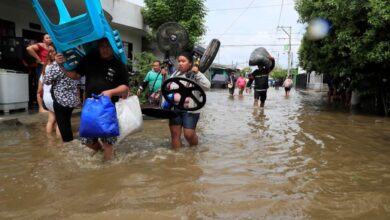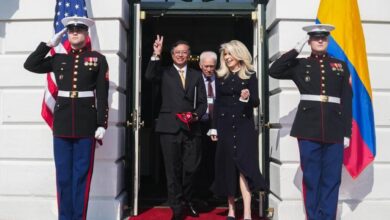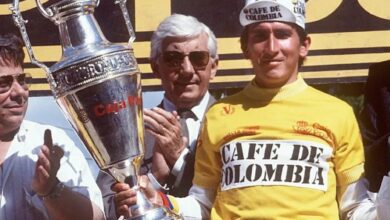Interview With Paloma Valencia: “I Have A Woman’s Agenda, But It’s A Different Agenda Than Feminism”
Paloma Valencia, senator and presidential candidate of the Democratic Center party, recognizes sexism in politics and hopes to see a woman soon in the Casa de Nariño.

Francia Márquez is a leader in my department, also from Cauca, with a different vision, a slightly hateful vision in my opinion. Photo: LatinAmerican Post
LatinAmerican Post | Santiago Gómez Hernández
Escucha este artículo
Leer en español: Entrevista a Paloma Valencia: “Tengo una agenda de mujer, pero es una agenda distinta al feminismo”
LatinAmerican Post starts a special on women in Colombia's presidential race. The first guest is the uribista senator and candidate, Paloma Valencia. A descendant of politicians and a member of one of the most recognized families in the country, she hopes to become the first woman to hold the highest political position in the country.
LatinAmerican Post .: What do you think of the role of women in Colombian politics?
Paloma Valencia: It is a role that has to finish climbing the stairs. Women have been advancing on the issue of equal rights. But still, after so many years, there has not been a woman in Colombia who has been president. I believe that building the rise of women's politics has only been concluded when someone has been president and then all the girls in this country and young women who want to enter the political career see a real possibility of being president as well. I don't think women are better than men or anything like that. But a society where women have open spaces is better.
LP: Do you think that the absence of women in the Colombian presidency is due to sexism within the country's politics?
PV: There is a lot of sexism, of course. You see it when you look at the few female candidates out there. It is seen in the lack of opportunities that women are given and above all, Colombians do not know what a woman who can govern has to be. I think it's a question that people still ask themselves. What are the characteristics that a woman who governs in Colombia must have?
You may also be interested in: Women in Colombia's Presidential Race
LP: What do you think of women in the cabinet and in Congress? Do you think they have contributed to women in Colombia?
PV: I think there are great women in politics. There is a great effort to stand out, to do things well, to occupy a place and occupy it well. Make that opportunity an example for all women and I believe that all are aware that being a woman in politics is opening or closing spaces for women. So, all of us being very aware of that, we try to do things extremely well.
LP: How do you see your political rivals for the presidency?
PV: I believe that each of the two women out there, Dr. María Fernanda Cabal and Dr. Francia Márquez, embody very different things. Of course, one (Cabal) is a close friend of mine and is part of my party. The other (Márquez) is a leader in my department, also from Cauca, with a different vision, a bit hateful in my opinion.
LP: Do you have women from whom you have been inspired by political, professional, or family life?
PV: From the family, definitely Josefina Valencia, who was my great-aunt, who was one of the women who managed to win the vote for women during the Government of General Rojas. She was the first woman minister, the first woman governor and was one of the first women elected as senators. For me, it is a great pride to see everything she did, the strength of character she had, the battles she gave, and her achievements. I have that reference in my family that drives me a lot.
There are women in the world who are incredible. One cannot stop thinking about La Pola and her bravery, her example, and her courage. In Manuelita, side by side to the liberator, giving all those big battles that she herself gave. And in political women, one has to start with Angela Merkel, who is perhaps one of the most important right-wing politicians in the world, with leadership, not only in her country, all of Europe depended on her. Margaret Thatcher, wonderful too.
How not to mention our vice president, who is the highest position a woman has ever reached. Noemí Sanín, who is an example of what women can do and of having led and of having been able to almost have been president of this country. Perhaps, no other woman like her has gone so far in that purpose. I would say that women's rights are being built like stairs. Once, someone does something, then that floor is ready for the next generation to climb, so you always have to think about which stairs we are building and that stair is ready. To those who built all the stairs down, remember them with admiration.
LP: Do you consider yourself a feminist and what is your opinion of the movement?
PV: No, not a feminist, because a feminist has a left-wing context and I am not from the left, nor do I agree with those ideas. I think I have a woman's agenda, but it is a different agenda than feminism. I do not believe in abortion as a right, nor do I believe that all women should be thrown in jail because they have an abortion under the three conditions that the Constitutional court has. I do not believe that women have to go out to work and if they do not go out to work, then they are not fulfilled and they are oppressed by the patriarchal model. I think women are free to choose what they want. I believe that women do have a special role with our children and that the State has to work for the mothers who are heads of households to meet the difficulties of not having a partner and that therefore the care of the children is whole and 100% at their hands. So there yes, if they wanted to go to work then they face very great difficulties. I believe that the State has an outstanding debt with the mothers who are heads of the household, who are 40% of the households in this country. We have to advance in consolidating large spaces so that all women have better rights in Colombia.
* The interview was summarized for understanding purposes





